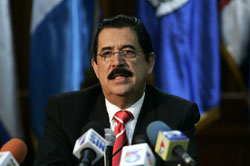Hypocrisy in Honduras
Wednesday, October 12, 2011

Efforts by rich countries to solve the Honduran crisis are a sham.
Following the ouster last June of Honduran President José Manuel Zelaya, most rich countries declared themselves to be the defenders of democracy, vigorously denouncing the coup, and indignantly cutting off financial aid to the Central American country.
But the rich world has no real interest in understanding the Honduran problem, or in making a long-term commitment to solving it.
As a result, its efforts are doing more harm than good.
As far as the coup itself is concerned, most rich countries quickly decided that it was an outrage.
But the facts don’t support such a simple conclusion.
Zelaya’s supporters may argue that the opposition could under no circumstances send in the army to expel a democratically elected president.
On the other hand, the opposition has reasonable grounds for claiming that Zelaya was using dirty tricks to try to stay in power, despite a constitutional prohibition against a President serving more than one term.
Then there is the incomprehensible way in which the rich world approached the issue of Honduras’ national elections, scheduled to take place in November.
To put pressure on the coup’s leaders, most rich countries said they would refuse to recognize the results, unless Zelaya is allowed to finish his term.
But this threat does nothing useful.
Whether or not the outside world gets its way, either Porfirio Lobo, a wealthy rancher, or Elvin Santos, a rich contractor, will be elected president - and whoever wins is likely to follow a policy based on making life good for upper-class Hondurans, while hoping that growth trickles down.
The only difference is that on one scenario Zelaya would be allowed to mope around for a few weeks as a figurehead.
On the other scenario, he wouldn’t.
Worst of all was the idea of cutting off aid to Honduras, Latin America’s second-poorest country, on the grounds that this was a good way to defend the rule of law.
But teaching moral lessons to small, weak countries is easy.
Meanwhile, none of the people running American and European foreign policy have at any time urged imposing economic sanctions on China, a one-party state which crushes freedom of expression, but which happens to own trillions of dollars of western debt, or Russia, a quasi kleptocracy, which sits on vast deposits of natural gas, without which much of Europe might spend the winter freezing in the dark.
In Honduras’ case, the right approach for rich countries would have been vigorously to denounce the coup, appoint an impressive-looking Committee of Investigation, announce that they would soon act decisively, and then do nothing – which is what they will eventually do, anyway.
When the crisis winds down, the reporters and camera crews will go home, and Honduras will fade back into obscurity.
The rich world will before long lift its ban on aid, and go back to making itself feel good by lending money to Honduras, without knowing or caring that most of the funds are wasted or stolen.
Meanwhile, millions of Hondurans will continue to suffer chronic problems of widespread poverty and rampant, violent crime.
They will – for a time – have the memory of rich countries claiming to defend Honduran democracy.
Too bad they won’t have much else.
Fred Blaser
Chairman
República Media Group
